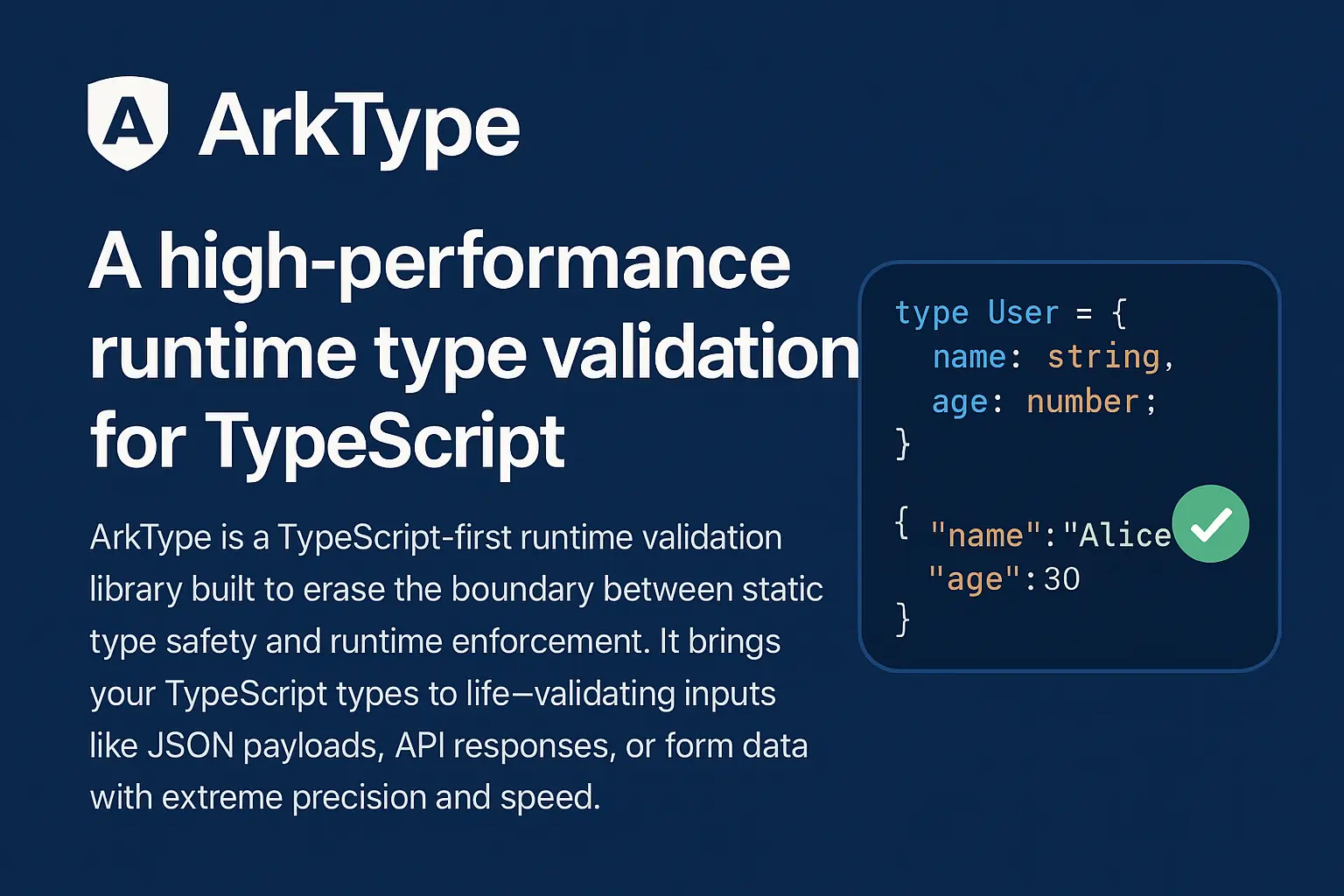ArkType: A high-performance runtime type validation for TypeScript
ArkType is a TypeScript-first runtime validation library built to erase the boundary between static type safety and runtime enforcement.
ArkType is a TypeScript-first runtime validation library built to erase the boundary between static type safety and runtime enforcement. It brings your TypeScript types to life—validating inputs like JSON payloads, API responses, or form data with extreme precision and speed.

Where other libraries like Zod or Yup introduce validation layers adjacent to your types, ArkType’s goal is fidelity: ensuring the type you wrote behaves identically at runtime, with minimal overhead and maximal confidence.
Why ArkType?
In modern TypeScript applications, validating untyped data is unavoidable.
However, most validation libraries require a mental mapping of how you define types and validate them.
ArkType eliminates this translation. With a design philosophy rooted in isomorphism, ArkType treats type validation as a runtime mirror of TypeScript's static type system—backed by aggressive optimization, set theory, and expressive type composition.
Runtime validation with type-level fidelity
ArkType’s type(...) syntax creates a runtime validator that matches your TypeScript definitions. There’s no need to define a schema and then infer the type—it’s a single source of truth, operating in both realms.
import { type } from "arktype";
const user = type({
id: "number",
name: "string",
email: /.+@.+\..+/,
});
user({ id: 1, name: "Zack", email: "zack@proser.dev" }); // passes
user({ id: "oops", name: "Zack", email: "not-an-email" });
// fails with clear error messagesKey features
Performance
ArkType is up to 100x faster than Zod and 2,000x faster than Yup in benchmarks. It compiles validations ahead of time into highly optimized functions.
Type syntax familiarity
The syntax will feel native to TypeScript developers. You don’t have to learn a new DSL—you’re writing shapes just like you would in a type alias.
Deep introspectability
Built on a foundation of set theory, ArkType can mathematically soundly reason about unions, intersections, literal types, ranges, and pattern constraints. This makes it ideal for advanced constraint logic.
Rich expression support
ArkType handles:
- Literal values
- Value ranges (
1..10) - RegExp patterns
- Discriminated unions
- Recursive structures (with
ark.recursive)
Customizable error handling
Validation errors are concise, composable, and deeply linked to your type expressions. You can customize messaging strategies to suit your app’s UX or logging layer.
Performance in practice
const check = type("string|number[]");
check("hello"); // OK
check([1, 2, 3]); // OK
check({}); // ❌ Error: Expected string or array of numbersThis one-liner compiles into a fast validator with minimal allocations and no hidden recursion.
Advantages over Zod and Yup
Zod is developer-friendly and lightweight, but ArkType offers a level of rigor and runtime speed unmatched by the alternatives.
ArkType shines for critical-path validation or validation in performance-sensitive environments (like APIs or form-heavy frontends).
When not to use ArkType
- If you’re targeting extremely tight JS bundles (e.g., on the edge), you may want to benchmark its runtime size.
- If your team is heavily invested in another schema language like JSON Schema or Joi, migration will require adapting to ArkType's distinct type grammar.
Final thoughts
ArkType is pushing the frontier of TypeScript validation—aligning the static and runtime worlds without compromise.
If you care about type safety, performance, and expressive power, ArkType is a strong contender for your toolkit.